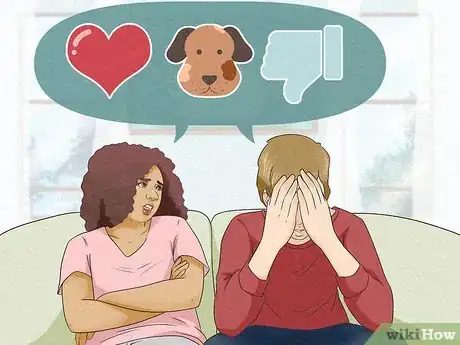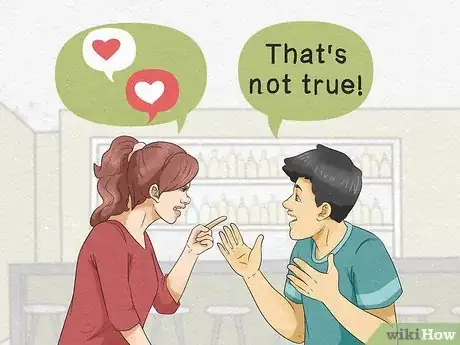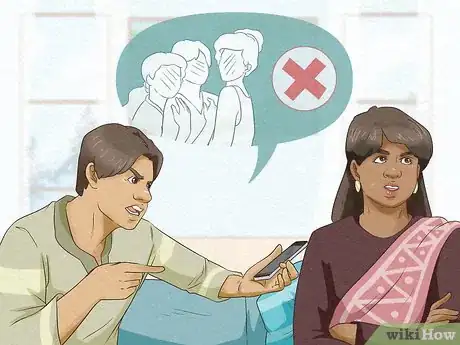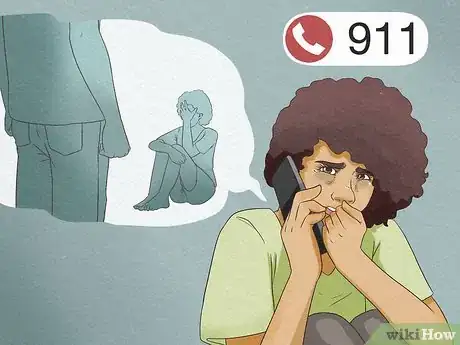This article was co-authored by Jason Polk, LCSW, LAC and by wikiHow staff writer, Hunter Rising. Jason Polk is a Relationship Counselor and the Owner of Colorado Relationship Recovery. With over 12 years of experience as a therapist, he specializes in helping couples build healthy and thriving relationships through counseling. Jason holds an MSW from Newman University, Colorado Springs. He is also a Level II Psychobiological Approach to Couple Therapy (PACT) therapist, Healing Our Core Issues (HOCII) Certified therapist, and has training in Relational Life Therapy (RLT).
There are 10 references cited in this article, which can be found at the bottom of the page.
This article has been viewed 9,705 times.
It's so exciting building a relationship with someone new, but how can you be sure they're going to treat you right? We know it's a little scary trying to figure out if you're with the right person, but it's important to catch any red flags early on so you can address them. Luckily, we're here to help you through it. This article lists some potential warning signs that you shouldn't ignore.
Steps
They don’t communicate.
-
Your partner should be able to openly talk about how they’re feeling.[1] X Expert Source

Relationship Counselor Expert Interview. 24 November 2021. It’s so important to share your emotions with your partner because it helps you build a really strong foundation for your relationship. If your partner stays quiet when you try expressing yourself or if they refuse to talk about themselves at all, it might be tougher to grow close with them.[2] X Research source- For example, if you try to talk about how you’re feeling in the relationship and they immediately change the subject, it may be a sign they aren’t able to communicate.
They’re not able to compromise.
-
It’s important to resolve conflicts in a healthy relationship. Usually when you have an argument, you can work together with your partner to come up with a solution that works for both of you. In an unhealthy relationship, your partner may already have their mind made up so they won’t listen to your concerns or even talk about the issue.[3] X Research source
- For example, if you’re arguing about who should do the chores, you should be able to come to an agreement. If your partner doesn’t agree to do anything about it, then it’s a red flag.
- If you notice that you’re arguing about the same things over and over again without anything changing, then that may be another sign.
They get jealous or insecure when you’re away.
-
Your partner should accept that you can do what you want. In a healthy relationship, you’ll be able to make the most out of the time you spend together. If you’re actively seeing your partner and they still get upset that you’re not spending time with them, then it may be a sign that they want to be more in control. They may also always ask where you were or what you were doing.[4] X Trustworthy Source Cleveland Clinic Educational website from one of the world's leading hospitals Go to source
- For example, they may keep messaging you for updates or demand that you respond to them right away.
- As another example, your partner may look visibly upset when you get home from spending time with friends.
They act disrespectful.
-
Your partner should treat everyone respectfully. You deserve to feel respected and valued in your relationship. While it’s normal for someone to slip up every now and then, it becomes an issue if your partner repeatedly makes you feel bad or hurts your feelings. Pay attention to how they interact with other people too since it may be easier for you to notice when they’re disrespectful.[5] X Trustworthy Source HelpGuide Nonprofit organization dedicated to providing free, evidence-based mental health and wellness resources. Go to source
- A common warning sign to look out for is if your partner actively tries to embarrass or humiliate you in front of other people.[6] X Research source
They constantly criticize you.
-
Your partner should be uplifting and boosting your confidence. It’s okay for you to make mistakes from time to time, but your partner shouldn’t make you feel any worse. They may be more harsh than usual or disapprove of things you’ve done. When your partner criticizes you, they’re trying to feel in control, but it adds a lot of unneeded and undeserved stress onto you too.[7] X Research source
- For example, they may say something like, “Are you really going to wear that tonight?” or “That was a really stupid idea.”
They’re dependent on you.
-
You should each have some independence in a relationship. Your partner should have their own friends, goals, and hobbies outside of the relationship – and so should you! When your partner is dependent on you, they may try to latch onto your other relationships or feel like they can’t do anything without you.[8] X Research source
- For example, if your partner only hangs out with you and your friends, it might be a red flag.
- In really serious cases, your partner may even threaten to do something drastic if the relationship ends. If this happens, reach out to someone you trust for advice and to talk about your situation.
They try to control the relationship.
-
You and your partner should work together to build your relationship. In a healthy relationship, you both can share responsibilities to help strengthen your bond. When your partner starts making all the decisions, then it could be a sign they want full control. They may even go as far as telling you what you’re able to do, what you can wear, and who you can hang out with, but you should make those choices on your own.[9] X Research source
- For example, your partner may say something like, “You can’t go out looking like that,” or, “You’re not going out tonight because you’re staying in with me.”
They don’t respect your online privacy.
-
Your partner should trust you without having to check on you. It’s completely normal for you to keep your online passwords to yourself so you have full control over your accounts. Someone who’s trying to be controlling may constantly check your social media pages, ask for your passwords, or even read through your texts and emails to see if you’ve been talking to anyone else.[10] X Trustworthy Source State of Massachusetts Official website for the State of Massachusetts Go to source
- For example, if your partner asks why you were messaging a specific person, it could mean that they looked through your phone or social media.
- You could try changing one of your social media passwords or logging out completely. If your partner brings it up, it may be a sign they were trying to check up on you.
They break your trust multiple times.
-
Your partner should tell the truth and avoid doing things behind your back. Relationships are built on trusting the other person, so it can be really concerning if you catch your partner in a lie. Everyone slips up every now and then, but it shouldn’t be a regular thing in your relationship. Keep your eye out for any patterns of lying or hiding the truth from you since it could grow to a larger issue.[11] X Research source
- For example, they may lie about where they were or break a promise that you made with them.
- Your partner may try to minimize anything they’ve done as well. For example, if you catch them flirting with someone else online, they may say they were just talking and that it wasn’t a big deal.
They easily lose their temper.
-
Your partner can get upset, but they should keep it under control. Everyone gets mad from time to time, but it’s a lot scarier if you can’t predict when or why. If you’re walking on eggshells because you aren’t sure what will upset your partner, then it’s a sign of a problem. You shouldn’t have to deal with any yelling, shouting, or any other outbursts just because they’re upset.[12] X Research source
- For example, if you do something minor, like spilling a drink on the floor, your partner may start raising their voice or damage something in your home when they’re angry.
They deny doing anything wrong.
-
Your partner should take responsibility for their actions. If your partner does something wrong, they may blame someone or something else for their behavior. They could say something like they had a bad day or that they had a bad childhood growing up. They may even try to shift the blame back onto you. Just know that it’s not your fault or responsibility to make them feel better.[13] X Trustworthy Source HelpGuide Nonprofit organization dedicated to providing free, evidence-based mental health and wellness resources. Go to source
- For example, if you caught your partner in a lie, they may try to say something like, “Well that wasn’t my intention,” or “I only screwed up because you distracted me.”
They isolate you from friends and family.
-
Your partner should let you have healthy relationships with others. It’s so important to have other people in your life that you can talk to and spend time with. A controlling partner may try to limit who you see and when you can see them. If you feel cut off from your loved ones, then you may want to reevaluate your relationship.[14] X Trustworthy Source Cleveland Clinic Educational website from one of the world's leading hospitals Go to source
- For example, your partner could say something like, “I don’t want you seeing Jason anymore,” or “Your mom can be so annoying. We shouldn’t visit her today.”
- Listen to how your partner talks about your friends and family. If they talk bad about your loved ones, they could be trying to talk you out of seeing them.
Other people mention they’re concerned.
-
Friends and family will point out any issues because they care about you. When you’re chatting with your loved ones, pay attention to how they speak about your partner. If they get a bad feeling or they bring up times when your partner made them feel uncomfortable, take it to heart and listen to them. They may be able to see issues from the outside that you haven’t caught onto yet.[15] X Research source
- For example, if your best friend says that they’re worried about your relationship, then you may want to hear them out.
They rush the relationship.
-
Your partner should take it slow so you can grow together. It takes a lot of time and work to build trust and love in a relationship. Even if you’re really into your partner, take a step back and keep it slow. If your partner tries to rush you into having sex, moving in together, or sharing accounts after a short time, then there’s a chance they may not have the right intentions.[16] X Trustworthy Source Cleveland Clinic Educational website from one of the world's leading hospitals Go to source
- For example, your partner may ask to share a joint bank account after knowing each other for a month or two.
- Always take your relationship at a pace that feels comfortable to you.
They pressure or guilt you into doing things.
-
You should feel comfortable doing things without your partner telling you. This could be about drinking, doing drugs, having sex, or doing any other activity you do together. When you’re in a relationship, you still get to choose whether you do something or not. Your partner doesn’t get to make those decisions for you.[17] X Research source
- For example, your partner could say, “I’d be really upset if you don’t do this for me,” or “Don’t you love me enough to sleep with me?”
They threaten or hurt you.
-
Any form of emotional or physical harm is a serious issue. You deserve to have a conversation and work through any problem that comes up. When your partner gets upset, pay attention to what they say or do to you. Any name-calling, threats, or physical violence are all forms of abuse and could develop into an unhealthy pattern.[18] X Trustworthy Source HelpGuide Nonprofit organization dedicated to providing free, evidence-based mental health and wellness resources. Go to source
- Emotional abuse can be anything from name-calling, disrespect, or purposely making you feel stressed.
- If you ever feel like you’re in immediate danger, call 911 as soon as you can.
Warnings
- If you’re in a potentially abusive relationship, contact the National Domestic Violence Hotline at 1-800-799-7233 for advice on how to safely get out of it.[23] X Trustworthy Source National Domestic Violence Hotline Organization providing lifesaving tools, support, and resources for victims and survivors of domestic abuse Go to source⧼thumbs_response⧽
You Might Also Like
 What's Your Red Flag Quiz
What's Your Red Flag Quiz
 How Long Should You Date Before Making It Official?
How Long Should You Date Before Making It Official?

 How to Prove You Love Him Other Than Saying "I Love You": 21 Cute Ways
How to Prove You Love Him Other Than Saying "I Love You": 21 Cute Ways



 How Soon Is Too Soon to Move In Together?
How Soon Is Too Soon to Move In Together?






References
- ↑ Jason Polk, LCSW, LAC. Relationship Counselor. Expert Interview. 24 November 2021.
- ↑ https://psychcentral.com/blog/imperfect/2018/11/11-relationship-red-flags-and-why-we-ignore-them
- ↑ https://psychcentral.com/blog/imperfect/2018/11/11-relationship-red-flags-and-why-we-ignore-them
- ↑ https://health.clevelandclinic.org/domestic-abuse-how-to-spot-relationship-red-flags/
- ↑ https://www.helpguide.org/articles/abuse/domestic-violence-and-abuse.htm
- ↑ https://smartcouples.ifas.ufl.edu/dating/dating-for-teens-and-youth/is-this-okay-red-flags-to-watch-out-for/
- ↑ https://www.uvmhealth.org/coronavirus/staying-healthy/relationship-red-flags
- ↑ https://static1.squarespace.com/static/54da632be4b0c3a7f3a8a90d/t/55689339e4b0d6fc6b6e2f28/1432916793921/Healthy+vs+Unhealthy.pdf
- ↑ https://static1.squarespace.com/static/54da632be4b0c3a7f3a8a90d/t/55689339e4b0d6fc6b6e2f28/1432916793921/Healthy+vs+Unhealthy.pdf
- ↑ https://www.mass.gov/service-details/recognizing-the-signs-of-unhealthy-relationships
- ↑ https://psychcentral.com/blog/imperfect/2018/11/11-relationship-red-flags-and-why-we-ignore-them
- ↑ https://www.uvmhealth.org/coronavirus/staying-healthy/relationship-red-flags
- ↑ https://www.helpguide.org/articles/abuse/domestic-violence-and-abuse.htm
- ↑ https://health.clevelandclinic.org/domestic-abuse-how-to-spot-relationship-red-flags/
- ↑ https://psychcentral.com/blog/imperfect/2018/11/11-relationship-red-flags-and-why-we-ignore-them
- ↑ https://health.clevelandclinic.org/domestic-abuse-how-to-spot-relationship-red-flags/
- ↑ https://smartcouples.ifas.ufl.edu/dating/dating-for-teens-and-youth/is-this-okay-red-flags-to-watch-out-for/
- ↑ https://www.helpguide.org/articles/abuse/domestic-violence-and-abuse.htm
- ↑ https://psychcentral.com/blog/imperfect/2018/11/11-relationship-red-flags-and-why-we-ignore-them#Why-do-we-ignore-red-flags?
- ↑ https://psychcentral.com/blog/imperfect/2018/11/11-relationship-red-flags-and-why-we-ignore-them#Why-do-we-ignore-red-flags?
- ↑ https://www.helpguide.org/articles/abuse/domestic-violence-and-abuse.htm
- ↑ Jason Polk, LCSW, LAC. Relationship Counselor. Expert Interview. 24 November 2021.
- ↑ https://www.thehotline.org/
About This Article





























































